In this article:
The American Academy of Dermatology states that it is normal to lose 50–100 strands of hair per day. (1) Anything more than that may indicate hair loss. Excessive hair loss is one of the most common health problems in the world today.
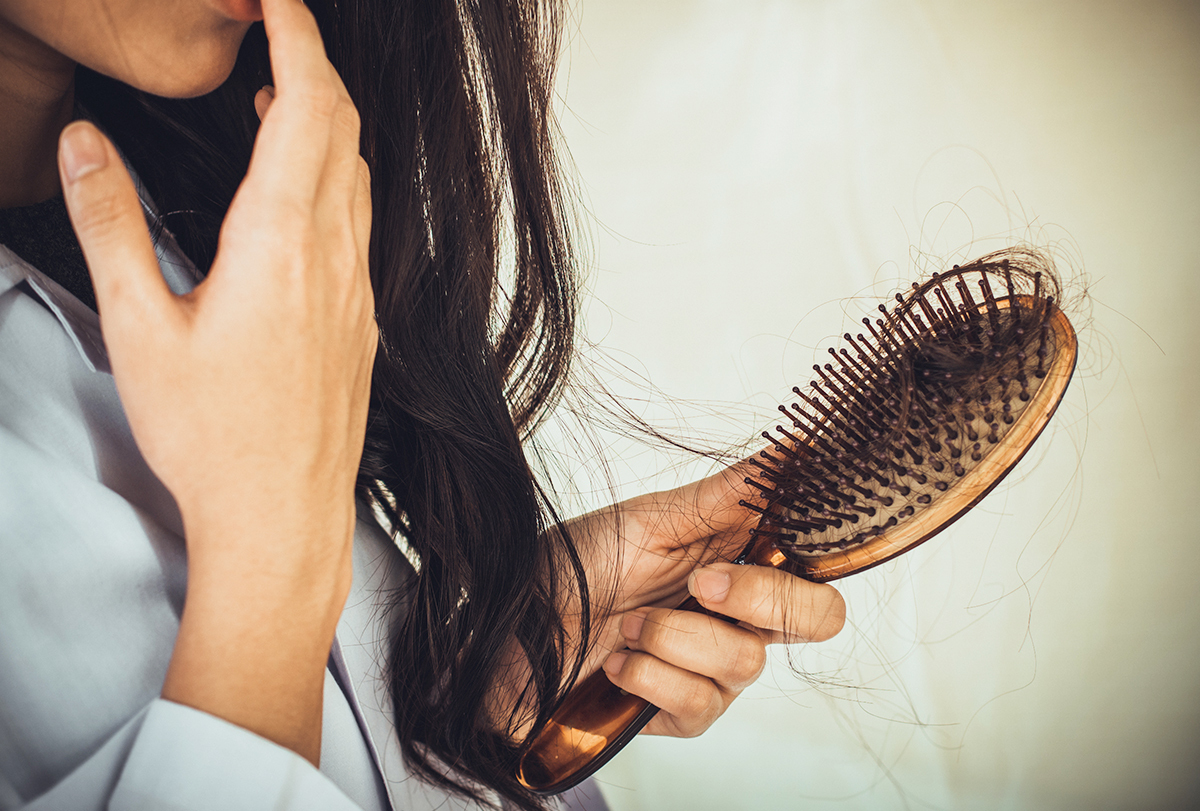
According to various studies, a third of the world’s population is experiencing hair loss earlier than usual in life. Increased stress, poor diets, environmental pollution, and the usage of harsh chemical products all contribute to this phenomenon. (2)
Fortunately, many natural remedies can help with hair regrowth and strengthening.
Herbs That Help Reduce Hair Loss
Ayurveda is an ancient herbal medicine therapy practiced in India, and several Ayurvedic herbs can help decrease hair fall. Read on to learn some of the best natural remedies for hair loss.
1. Indian gooseberry (Amla)
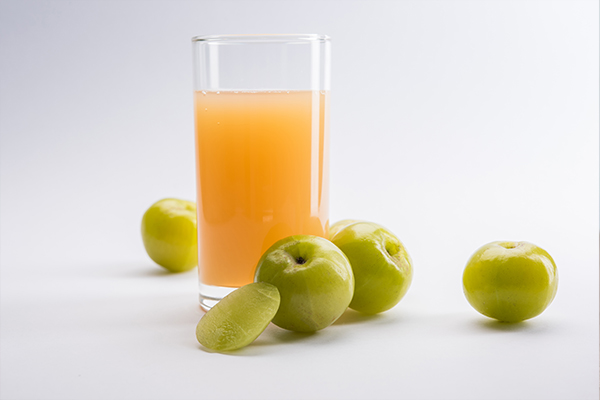
Amla, also known as Indian gooseberry, is a powerful natural remedy for hair loss. It contains high levels of iron, vitamin B, phosphorus, and carotene. These nutrients are known to promote hair growth and strength. (3)
How to use
a. Amla and shikakai hair pack for hair growth
Ingredients:
- 2 tbsp amla powder
- 2 tbsp shikakai powder (4)
- 1 tsp coconut oil
Steps:
- Blend amla and shikakai powder with coconut oil to form a paste.
- Apply this paste to your hair along its length.
- Let it sit for half an hour.
- Wash it off with a mild shampoo.
b. Amla oil
Ingredients:
- ¼ cup dried amla
- 1 cup coconut oil (5)
- A few curry leaves
Steps:
- Boil dried amla in coconut oil until the oil turns brown.
- Add 10 curry leaves to it.
- Remove from heat and let it cool.
- Strain the mixture and store it in a jar.
- Massage your scalp with this hair oil and let it sit for half an hour.
- Wash it off with a mild shampoo.
c. Amla and yogurt hair mask for hair growth
Ingredients:
- 2 tsp amla powder
- Warm water
- 2 tsp yogurt (6)
- 1 tsp almond oil
Steps:
- Mix water and amla powder to form a paste.
- Add the yogurt, almond oil, and honey (7) to this paste.
- Apply this paste to your hair evenly.
2. Rosemary
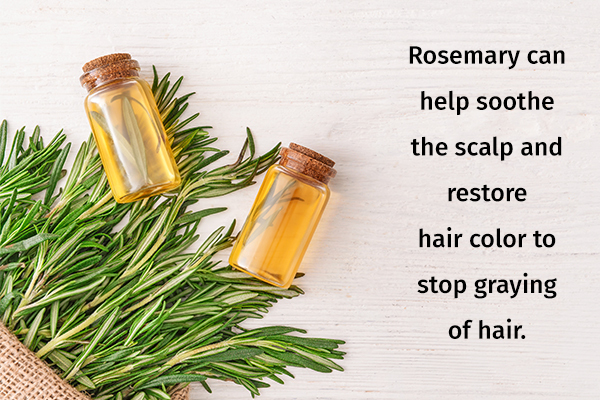
Rosemary is an herb known for its medicinal properties. It can help soothe the scalp and restore hair color to stop graying of hair. (8) Rosemary can also help cure androgenetic alopecia in some cases.
How to use
Ingredients:
- Rosemary oil
- 2 tsp carrier oil
Steps:
- Pour rosemary oil into a bowl and add the carrier oil to it. Mix them well.
- Massage this oil mixture onto your scalp for a few minutes.
- Let it rest for half an hour and then wash it off.
3. Shatavari
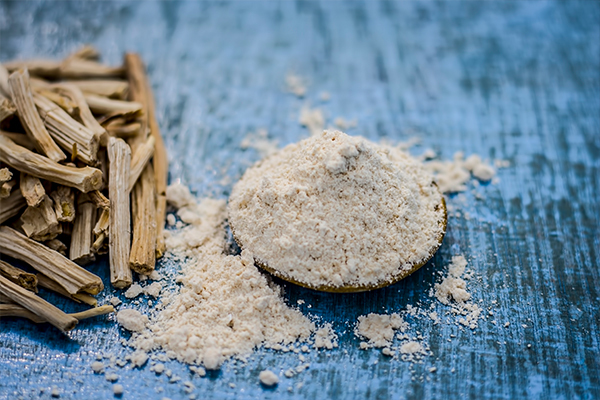
Shatavari is an Ayurvedic herb that helps promote hair growth. It has anti-inflammatory compounds that can help soothe the scalp and reduce stress – both physical and mental. Reducing stress helps control hair fall. (9)
How to use
Ingredients:
- 1 cup milk
- 1 tbsp shatavari powder
Steps:
- Add a teaspoon of shatavari powder to a glass of water or milk.
- Drink this milk once a day.
4. Ginseng
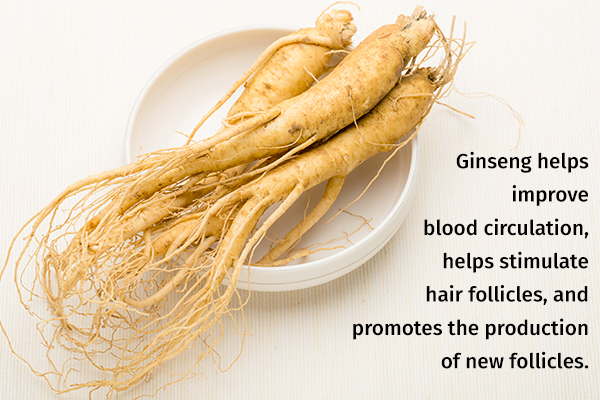
Ginseng is another efficient natural remedy for hair loss. It helps improve blood circulation, helps stimulate hair follicles, and promotes the production of new follicles. (10)
Ginseng also induces the hair growth phase (anagen phase) of the hair follicles. (11) It is also used in many hair care products.
How to use
a. Ginseng oil massage
Ingredients:
- 3 tsp ginseng-infused oil
- Coconut oil/olive oil
Steps:
- Mix the two oils well.
- Massage this oil onto your scalp for 10–15 minutes.
- Leave it on for half an hour before washing it off.
b. Ginseng tea massage
- Massage ginseng tea on your scalp before going to bed.
- Wash it off with mild shampoo the next morning.
- Use this remedy at least twice a week.
5. Ginkgo biloba
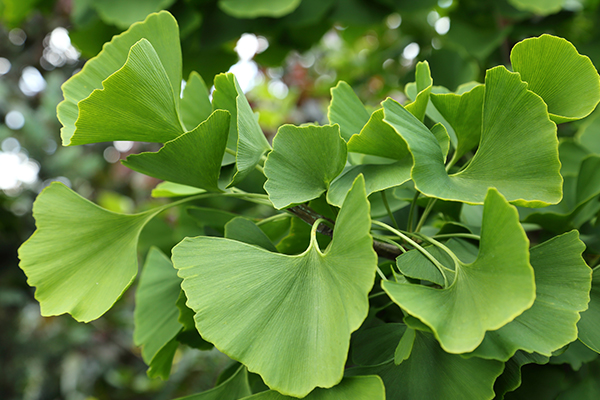
Ginkgo biloba is an herb that can help increase blood circulation to the scalp. (12) It can stimulate the hair follicles to promote hair growth. According to the International Journal of Pharmtech Research, this herb can be used as a potent hair tonic.
Ginkgo biloba can be applied topically or ingested as a supplement or tea.
How to use
a. Ginkgo tea
Ingredients:
- 1 cup of water
- 1 tsp ginkgo leaves
Steps:
- Boil a cup of water and add the ginkgo leaves to it. Let it boil for 10–15 minutes.
- Strain the liquid and drink it.
b. Ginkgo hair mask
Ingredients:
- 1 tsp ginkgo biloba powder
- 1 chopped banana
- 2 tsp coconut oil
- 1 tsp honey
Steps:
- Mix all the ingredients and apply this mask to your hair.
- Leave it on for half an hour, and then rinse it off with a mild shampoo.
6. Licorice
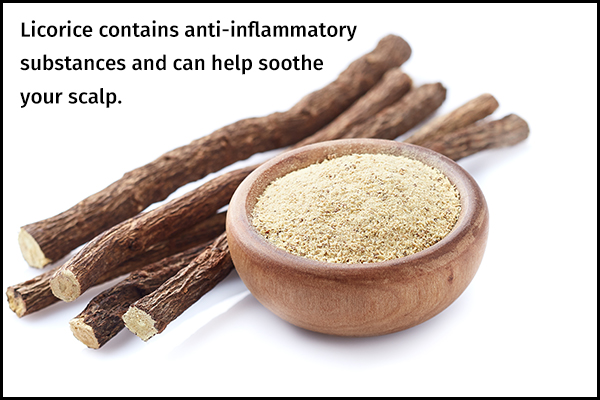
Licorice root has natural healing properties. It improves blood circulation to the scalp to promote hair regrowth. (13) Licorice also contains anti-inflammatory substances and can help soothe your scalp.
How to use
Ingredients:
- 1 tbsp licorice powder
- 1 tsp saffron
- 1 cup milk
Steps:
- Mix all the ingredients well.
- Apply this mixture to your scalp at bedtime, paying special attention to areas with visible hair loss.
- Cover your hair with a shower cap and let the hair mask rest overnight.
- Wash it off in the morning.
7. False daisy (Bhringraj)
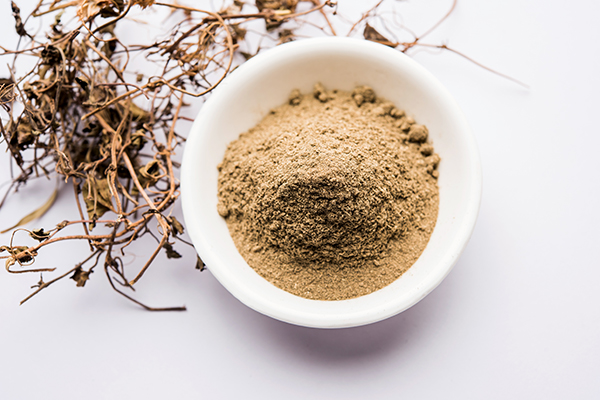
Bhringraj (Eclipta prostrata), also known as false daisy, is a plant that belongs to the sunflower family. Studies show that bhringraj extracts may be more effective than prescription medicines for the treatment of male-pattern baldness.
Bhringraj contains several antimicrobial properties that can help fight scalp infections and dandruff. (14) It also helps increase the number of hair follicles on the scalp and activate hair follicles that have turned dormant. Bhringraj can be used as an oil or powder.
How to use
a. Bhringraj oil massage
Ingredients:
- A handful of bhringraj leaves
- 1 tbsp fenugreek seeds
- 1 cup coconut oil
Steps:
- Heat the coconut oil for a few minutes on low heat.
- Add the fenugreek seeds and bhringraj leaves to this oil.
- Remove the mixture from heat and set aside to cool.
- Strain the oil and store it in a jar.
- Massage this oil onto your scalp and leave it on for an hour or two before washing it off.
- Use this remedy twice a week for at least 2 months.
b. Bhringraj paste massage
Ingredients:
- 1 tbsp bhringraj powder
- ¼ cup warm coconut oil/olive oil
Steps:
- Mix bhringraj powder and oil.
- Massage this paste onto your scalp and let it sit for 2 hours.
- Rinse it off with a mild shampoo.
8. Hibiscus

Hibiscus flowers are rich in vitamin C and several antioxidants. They can boost collagen levels in your scalp to nourish the hair follicles and promote hair growth. (15)
Hibiscus may even help reactivate dormant hair follicles, promoting growth of new hair.
How to use
Ingredients:
- A handful of hibiscus leaves or flowers
- ½ cup coconut oil
- 2 tbsp castor oil
Steps:
- Heat the coconut oil and add castor oil to it.
- Crush the hibiscus leaves/flowers and add them to the oil.
- Let the mixture cool.
- Massage this oil on your scalp and leave it to rest for an hour.
- Wash it off in the morning.
9. Brahmi
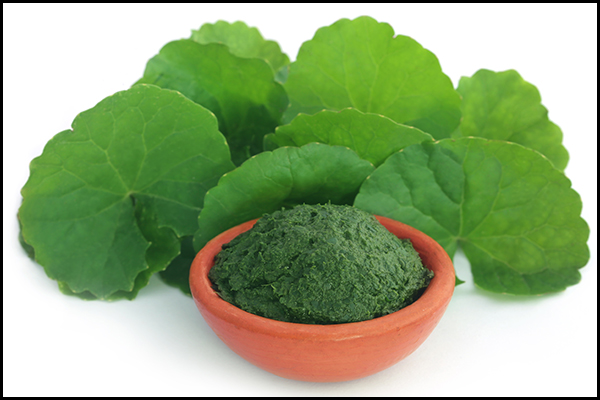
Brahmi oil is a potent Ayurvedic medicine usually made from the herb Bacopa monnieri or gotu kola. It is rich in antioxidants and can help improve blood circulation. This can boost oxygen and nutrient supply to the scalp, thus preventing hair loss and increasing hair growth. (16)
How to use
Ingredients:
- ¼ cup sesame oil
- 1 cup coconut oil
- Brahmi leaves or 2 tbsp brahmi powder
Steps:
- Mix coconut oil and sesame oil and heat the oil mixture on a low flame.
- When it comes to a boil, add the brahmi leaves or brahmi powder to the oil.
- Stir it for a few minutes on low flame.
- Remove the oil from heat and let it cool.
- Strain the oil and store it in a jar.
- Gently massage the oil on your scalp and let it sit for an hour before washing it off.
10. Stinging nettle
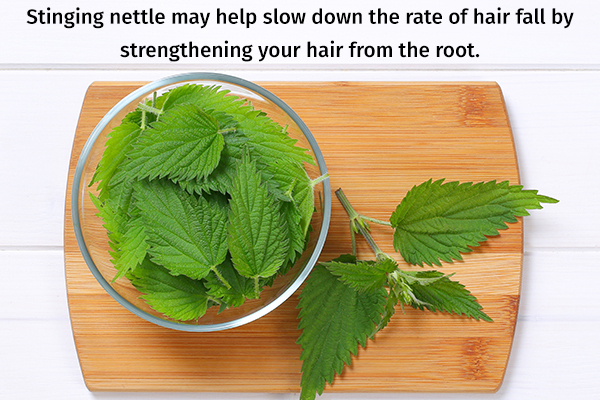
Stinging nettle is a plant that contains several antibiotic and cleansing properties. It may help slow down the rate of hair fall by strengthening your hair from the root.
Nettle is known to increase blood circulation to the scalp, rejuvenate the hair follicles, and restore hormonal balance. (17)
How to use
a. Nettle oil massage
Ingredients:
- A handful of nettle leaves
- 1 cup olive oil (18)
Steps:
- Grind a few nettle leaves and mix them in 1 cup of olive oil.
- Let this mixture sit for a couple of days in a jar.
- Use this oil to massage your scalp for 10–15 minutes and leave it on for half an hour before washing it off.
- Repeat this remedy at least twice a week for best results.
b. Nettle supplement
Nettle can be consumed as a supplement in the form of pills.
11. Tulsi (holy basil) leaves
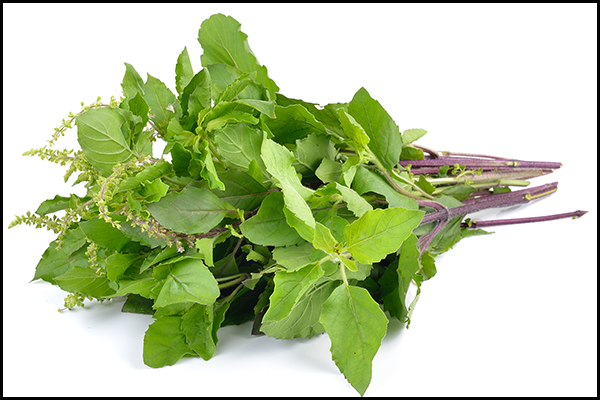
Tulsi is one of the most commonly prescribed herbal remedies for hair loss. It strengthens the hair roots and improves blood circulation to the scalp and hair follicles.
Crush some curry leaves and add them to a cup of warm coconut oil. Massage this mixture on your scalp, and leave it on for at least half an hour before rinsing it off. Repeat this process at least once a week.
12. Curry leaves
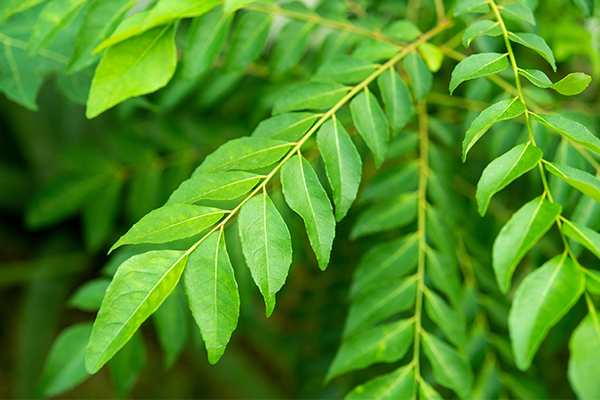
Curry leaves can strengthen your hair significantly to prevent hair loss. Boil curry leaves in coconut oil and massage the oil on your scalp after cooling. (19)
13. Sage
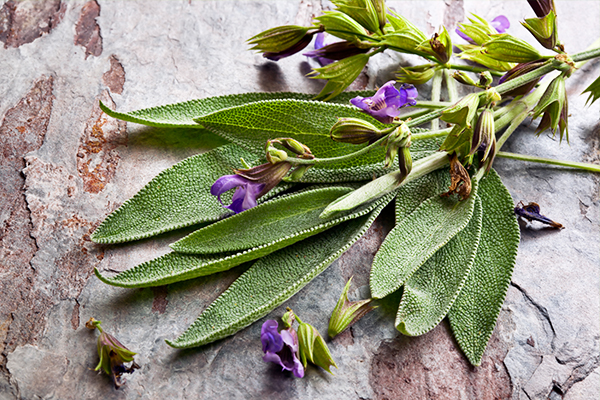
Sage contains powerful antiseptic and cleansing properties that can make your hair stronger and thicker. (20) Boil sage leaves in water and use it to rinse your hair.
14. Horsetail
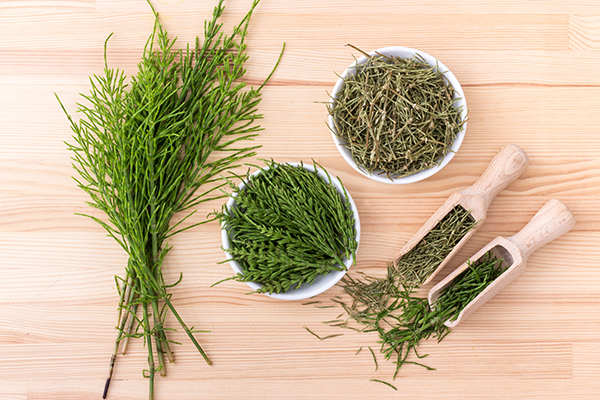
Horsetail can soften your hair and thus decrease hair fall due to brittleness. (21) It can be consumed on its own as a supplement or you can buy products that contain horsetail as an additive.
Make sure to drink lots of water if you are consuming horsetail as it is a diuretic.
Hair Growth Issues That Need to Be Addressed First
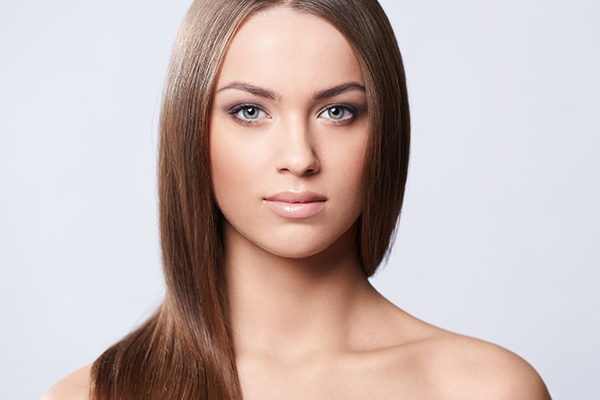
There are some hair growth facts and issues you need to know before starting treatment. Here are some of them:
- The rate at which your hair grows is determined by your genes.
- Insomnia and improper sleep can affect your hair growth significantly.
- Some people suffer from a genetic condition called androgenetic alopecia – also known as male- or female-pattern baldness.
- Dehydration or lack of water can contribute to hair loss.
- Nutrient deficiencies and improper diets are known to cause hair fall.
- Certain drugs can cause thinning of hair.
- Hormonal imbalances such as polycystic ovarian disease (PCOD) and thyroid disease can slow down hair growth.
- Certain diseases such as skin cancer or diabetes can cause hair loss in some people.
- Age is a factor for hair growth, and aging may cause hair loss.
- Telogen effluvium is a scalp disorder that causes excessive hair loss. It can be triggered by fasting, pregnancy, hormone imbalances, etc.
- Some scientists believe that hair regrowth is mostly impossible after 40% of your hair has been lost.
- Meet your dermatologist to rule out any scalp and hair disorders such as alopecia areata, folliculitis, sebopsoriasis, etc., that may be triggering your hair loss. The doctor will prescribe the appropriate treatment accordingly.
Lifestyle Changes to Manage and Prevent Hair Loss
A few changes to your daily routine can help in managing hair loss. Here’s what you can do:
- Make sure to get at least 8 hours of sleep every day.
- Choose a mild shampoo without harmful chemicals to wash your hair.
- Drink water from a copper vessel to replenish copper levels in your body.
- Use coconut oil or almond oil to massage your scalp twice a week.
- Practice yoga every day. Otherwise, lie on a bed or cot with your head hanging down from the edge for a few minutes every day to increase blood flow to your head.
- Cover your hair with a scarf or hat before going outdoors to prevent pollution damage.
General Queries
How does excessive washing, styling, or coloring affect the hair?
Many hairstyling tools and products can damage your hair irreversibly. Dyeing, perming, and straightening your hair regularly can lead to increased hair fall and eventually hair loss.
Shampoos that contain harsh chemicals can also be damaging to your hair in the long run. Always use mild pH-balanced shampoos for hair washing.
Hair appliances that use heat such as dryers, curlers, and straighteners can weaken your hair strands and cause breakage. Usage of these heating tools too close to the scalp can cause permanent damage to your hair follicles.
Is it normal to lose hair?
It is normal to lose a few strands of hair every day. However, losing more than 100 strands of hair in a single day can be a sign of hair loss and may require medical intervention.
What kind of a doctor should I consult for my hair fall problems?
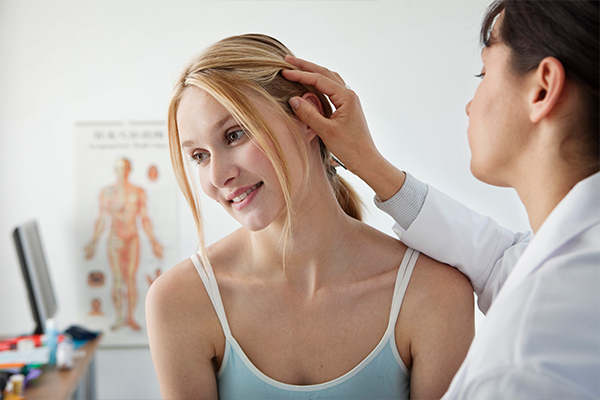
Hair loss can be caused by a variety of factors. Endocrine disorders (such as PCOD, hypopituitarism, and thyroid disease) and dermatological diseases (such as eczema and psoriasis) can lead to excessive hair fall.
You should visit a dermatologist to discuss your hair loss problem. They may ask you a few questions and run some tests to figure out the reason behind it.
For hair loss that stems from skin or scalp issues, the dermatologist will be able to treat the issue. However, if your hair fall is associated with other conditions such as endocrine disorders, they may refer you to an endocrinologist for treatment.
You can also visit a trichologist for hair loss treatment. A trichologist is a specialist in the field of hair and scalp health.
Final Word
Hair loss can be a distressing experience for many people. It is important to remember that stress will only increase your hair fall and is not the answer to your problem.
Instead, focus on finding the right treatment for your hair and incorporating certain lifestyle changes to improve your hair health.
- Was this article helpful?
- YES, THANKS!NOT REALLY


